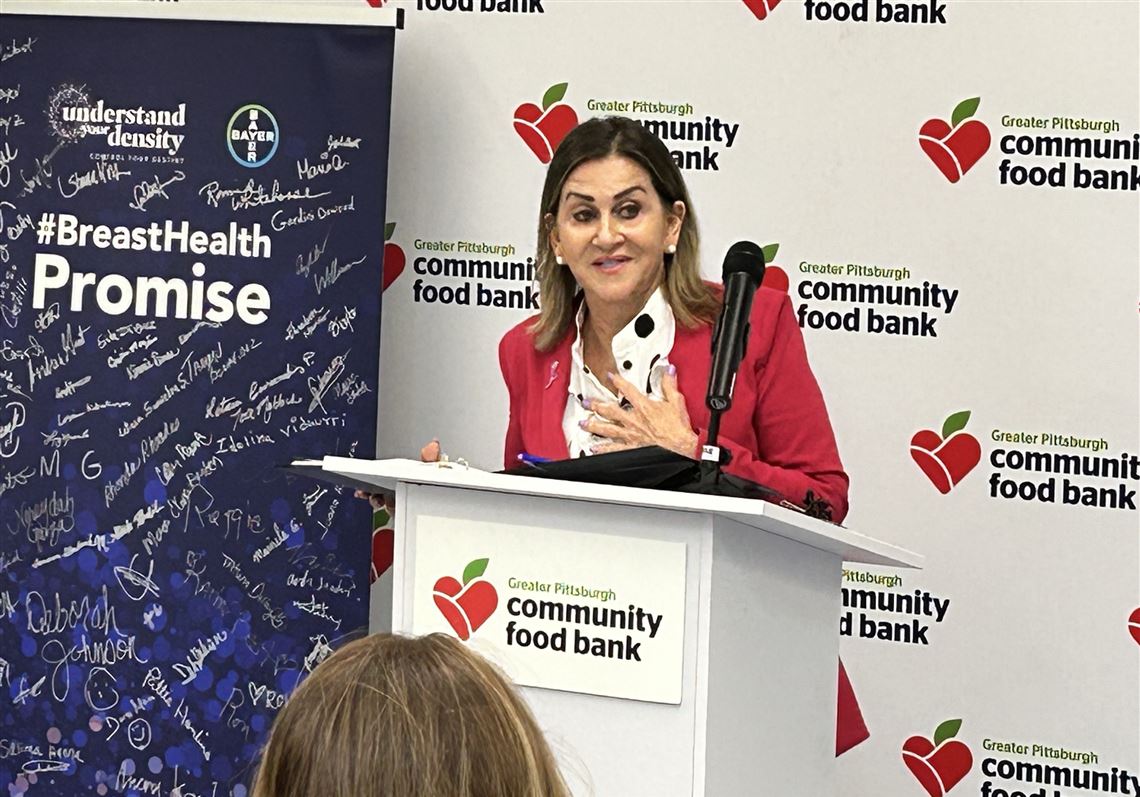Pittsburgh Public-Private Partnership to Improve Women’s Health Care Access

A Pittsburgh area public-private partnership is taking aim at some of the health disparities dividing rural and urban America by recruiting women living outside the city to get mammograms and other primary medical care services that might otherwise be neglected.
Bayer, UPMC Magee-Women’s Hospital and state Sen. Kim Ward arranged to bus women to UPMC’s West Mifflin imaging center from the Greater Pittsburgh Community Food Bank in Duquesne Tuesday for mammograms, bone density, cholesterol and other health screenings. On Wednesday, a second group of women will be bussed to UPMC’s Monroeville imaging center from Westmoreland Food Bank in Delmont for health screenings.
Next spring, mobile imaging vans will be sent to rural areas to further improve access to health care.
“We need to take care of the poorest of the poor,” said Ms. Ward, a breast cancer survivor and Republican Senate president pro tempore from Westmoreland County. “We need to step up.”
Bayer’s Indianola campus is the company’s pharmaceuticals’ hub for radiology operations. Since 2015, the company also has been the presenting sponsor for country singer-songwriter Luke Bryan’s Farm Tour as part of Bayer’s Health for All, Hunger for None campaign.
Grant money helps UPMC offset some of the costs of mammograms and other care, a spokeswoman said.
The state Health Department offers free mammograms and cancer testing for women meeting age and income guidelines, but glaring health disparities persist and divide rural and urban areas of the state. People living in rural areas of the U.S. tend to be older and sicker than people living in larger cities, according to the Centers for Disease Control and Prevention.
Rural residents overall have higher rates of cigarette smoking, high blood pressure and obesity and shorter lifespans than urban dwellers, research has shown. In addition, the health disparities have widened in recent years between residents of the two areas.
“Our mission is to save women’s lives,” said Margarita Zuley, chief of breast imaging at UPMC Magee. “Part of that is lowering the barriers to care. We are not here for one day, not two events. We are here for the long haul.”
Dr. Zuley, a New Castle native, said she knew well the health challenges and food insecurities facing many rural residents. Her father’s family relied on food stamps while he “ate ketchup soup for four years” as a student attending college on the GI bill, which put her in a better financial spot as a child than he had.
About the rural-urban health disparities, she added, “It’s shameful.”
Original post at Pittsburgh Post-Gazette
Bayer, UPMC Magee-Women’s Hospital and state Sen. Kim Ward arranged to bus women to UPMC’s West Mifflin imaging center from the Greater Pittsburgh Community Food Bank in Duquesne Tuesday for mammograms, bone density, cholesterol and other health screenings. On Wednesday, a second group of women will be bussed to UPMC’s Monroeville imaging center from Westmoreland Food Bank in Delmont for health screenings.
Next spring, mobile imaging vans will be sent to rural areas to further improve access to health care.
“We need to take care of the poorest of the poor,” said Ms. Ward, a breast cancer survivor and Republican Senate president pro tempore from Westmoreland County. “We need to step up.”
Bayer’s Indianola campus is the company’s pharmaceuticals’ hub for radiology operations. Since 2015, the company also has been the presenting sponsor for country singer-songwriter Luke Bryan’s Farm Tour as part of Bayer’s Health for All, Hunger for None campaign.
Grant money helps UPMC offset some of the costs of mammograms and other care, a spokeswoman said.
The state Health Department offers free mammograms and cancer testing for women meeting age and income guidelines, but glaring health disparities persist and divide rural and urban areas of the state. People living in rural areas of the U.S. tend to be older and sicker than people living in larger cities, according to the Centers for Disease Control and Prevention.
Rural residents overall have higher rates of cigarette smoking, high blood pressure and obesity and shorter lifespans than urban dwellers, research has shown. In addition, the health disparities have widened in recent years between residents of the two areas.
“Our mission is to save women’s lives,” said Margarita Zuley, chief of breast imaging at UPMC Magee. “Part of that is lowering the barriers to care. We are not here for one day, not two events. We are here for the long haul.”
Dr. Zuley, a New Castle native, said she knew well the health challenges and food insecurities facing many rural residents. Her father’s family relied on food stamps while he “ate ketchup soup for four years” as a student attending college on the GI bill, which put her in a better financial spot as a child than he had.
About the rural-urban health disparities, she added, “It’s shameful.”
Original post at Pittsburgh Post-Gazette



